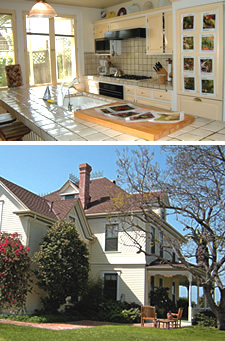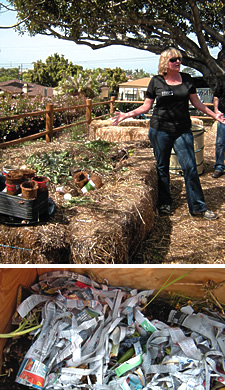 BioCycle September 2011, Vol. 52, No. 9, p. 20
BioCycle September 2011, Vol. 52, No. 9, p. 20
Olivewood Gardens and Learning Center in San Diego County uses gardening, composting and cooking to educate school children and adults about a healthier lifestyle.
Rich Flammer
OLIVEWOOD Gardens and Learning Center in National City, California has made impressive strides towards fulfilling its vision “to connect and motivate students and families from diverse backgrounds through organic gardening, environmental stewardship and nutrition education” and empower them “to be healthy and active citizens.” Fertile compost-amended soil in the gardens sprouts healthy fruits and vegetables that school kids and volunteers help to grow. Between student field trips, community visits, classes and tours, nearly 8,000 children, adolescents and adults have already visited Olivewood since it opened in February 2010.

National City is San Diego County’s second oldest jurisdiction, located 15 miles from the Mexican border. Olivewood Gardens and Learning Center (OGLC) occupies a 6.85 acre property with a history that couldn’t have been more fitting for the organization’s purpose. The land and 4,000 square foot Princess Anne Victorian home had been owned by John and Christy Walton. John was the son of Walmart founder Sam Walton. When his father was dying of cancer, John flew around the world looking for a cure. The disease ultimately took his father’s life. Years later, when Christy and John’s only child Lukas was diagnosed with cancer, they found the cure in the form of a half-acre organic garden at their home in National City.
In 2006, the year after John Walton died in a plane crash, Christy Walton endowed the property to the International Community Foundation (ICF), a charitable organization that fosters cross-border philanthropy. She stipulated that the lower gardens she attributes to saving her son’s life continue to be maintained for organic vegetable production and to promote healthy communities and diet. The ICF established a supporting organization that began as the ICF Center and was renamed Olivewood Gardens and Learning Center. The ICF then gifted the entire property to Olivewood.
Olivewood has developed an expanded, supercharged approach to health and nutrition designed to help thousands of children suffering from a wide range of diseases, especially obesity, diabetes, heart disease, various ailments associated with nutritional deficiency, or just overall marginal health due to poor diet. Educational programs, management and fundraising are led by Executive Director Amy Carstensen and Education Coordinator Michelle Cox.
Carstensen was a Program Officer and Director of Operations for the ICF before becoming director of OGLC. “We are so fortunate that the Walton’s donated such a beautiful property that is now serving the community,” she says. “Olivewood started as an idea to have a children’s garden that has blossomed into a learning center for thousands.” Cox has worked as a soils and restoration ecologist, and before joining Olivewood, ran an array of countywide environmental education programs. Both have extensive teaching experience and excellent bilingual educational skills.

GARDENING, COMPOSTING … AND COOKING
Olivewood has three levels of gardening classes: 101, 201 and 301. Students are scheduled to come four times over the school year. “All of the schools in National City require uniforms,” says Cox. “So the kids are excited when they come here because they get to wear grub clothes!” The lesson plans are designed to encourage children and parents to “explore connections between plants, history, science, art, literature, math and nutrition, where learning is centered within the context of organic gardens and a demonstration kitchen,” she adds. Olivewood’s standards-based approach to science broadens the scope of nutrition education and is taught with a heavy emphasis on sustainable agriculture and environmental stewardship. “Our program is entirely hands-on,” notes Cox.
Composting is a key component of the gardens’ fertility, but OGLC lacks sufficient feedstock to produce enough compost to meet its needs. Everything generated on site, including clippings, weeds, unusable fruits and vegetables from the gardens and fruit and vegetable scraps and soiled paper from Olivewood’s kitchen are composted. Straw for bulking agent is imported, as are inputs required for biodynamic piles, which is one of the three composting systems that Olivewood employs. It also utilizes a standard thermophilic system of pitchfork aerated piles, and vermicomposting done in a 2- by 8-foot homemade worm bin and Can-O-Worms unit. Shredded newsprint and office paper is used for worm bedding, and only fruit and vegetable scraps are composted. Carstensen was surprised by the popularity of the wiggly digesters: “Our worm bin built by one of our volunteers has turned hundreds of students and teachers into worm lovers,” she says.
Less than five tons of material are composted a year, but future plans call for increased tonnage to meet the soil-amending requirements of the gardens. Compost is used for new bed establishment, potting mixes and sometimes as mulch. “Our composting is the lifeline of our garden,” adds Carstensen. “We have partnered with the San Diego Center for Children to increase the amount of compostable kitchen waste. Each week the students pick up kitchen scraps from a local restaurant, Cucina Urbana, and bring it to Olivewood. We just recently ‘harvested’ their first compost pile for our summer planting.”

To be able to provide extensive programming, OGLC relies on volunteers. Some 5,400 hours of adult volunteer time were accrued in the past year, donated by local chefs and food professionals, teachers, scientists, gardeners and many others from all walks of life wanting to help further the center’s mission. One key volunteer has been Julie Darling, a San Diego-based chef and caterer. Darling launched a very successful volunteer visiting chef program for Olivewood. Guest chefs, cooks and food professionals teach healthy cooking and eating to low-income children in grades 4 to 6 from the National City School District. Ten to 12 children can fit in the kitchen at any one time. More than 80 volunteer chefs, many from some of the best restaurants in San Diego County, have cooked, taught and served at Olivewood Gardens in the past year.
Recently Olivewood was selected as one of five Regional Garden Education Centers as part of a San Diego County’s Healthy Works initiative to improve health and combat obesity. San Diego health officials estimate one third of all school-aged children in the county are overweight or obese. The Regional Garden Education Centers have been designated as “community-based hubs for garden education,” offering free “classes and hands-on experience in basic, community, and school gardening.” Designed for “current and future gardeners of all skill levels,” the Healthy Works’ goal is for the centers to “help San Diego County thrive as a place where fresh produce is grown in our schools and communities” (www.healthyworks.org).
In addition to learning about cooking, nutrition, composting, agronomy, ecology, water conservation and sustainable gardening, landscaping and agriculture, adult and adolescent visitors to the center are introduced to or are reminded of the value of collaboration, community and giving back, even if it’s only an hour of time to pull some weeds or a $12 donation that will cover the cost of one underserved child’s field trip. “We rely heavily on volunteers,” Carstensen says, “and we still need financial support to keep the day to day operations going.”
Olivewood Garden’s incredible first year success is a testament to the proficiency, dedication and hard work of its staff and the impressive number of volunteers who have made the center’s programs flourish. It also suggests a rising tide of interest exists among San Diego County residents to improve their quality of life by eating better, maintaining a healthy weight and reconnecting with their community and the soil that it depends on.
The gardens and learning center are a welcomed catalyst for moving closer to these goals. In addition to a larger kitchen, more feedstock and compost, and expanded program offerings at Olivewood, National City is entertaining the thought of converting about a quarter of its nine-hole, 44-acre public golf course into a community farm as part of a larger redevelopment plan that OGLC would manage. Although still in planning and not without some citizen debate, the social and environmental impacts of Olivewood alone may be enough to persuade the conversion. Concludes Carstensen: “Olivewood’s goal is to inspire and motivate children and families to live healthier lives and we have testimony after testimony from kids, parents, and teachers telling us that we are!”
Rich Flammer of Hidden Resources is a composting consultant and Contributing Editor to BioCycle. For more information on Olive Gardens and Learning Center, or to make a donation, visit: olivewoodgardens.org.
September 19, 2011 | General










